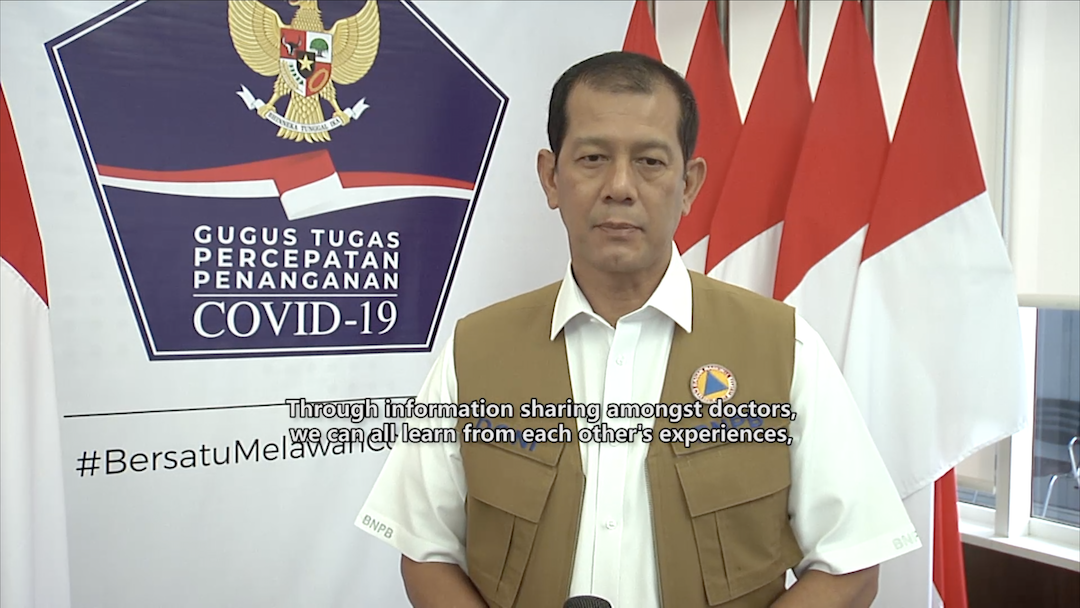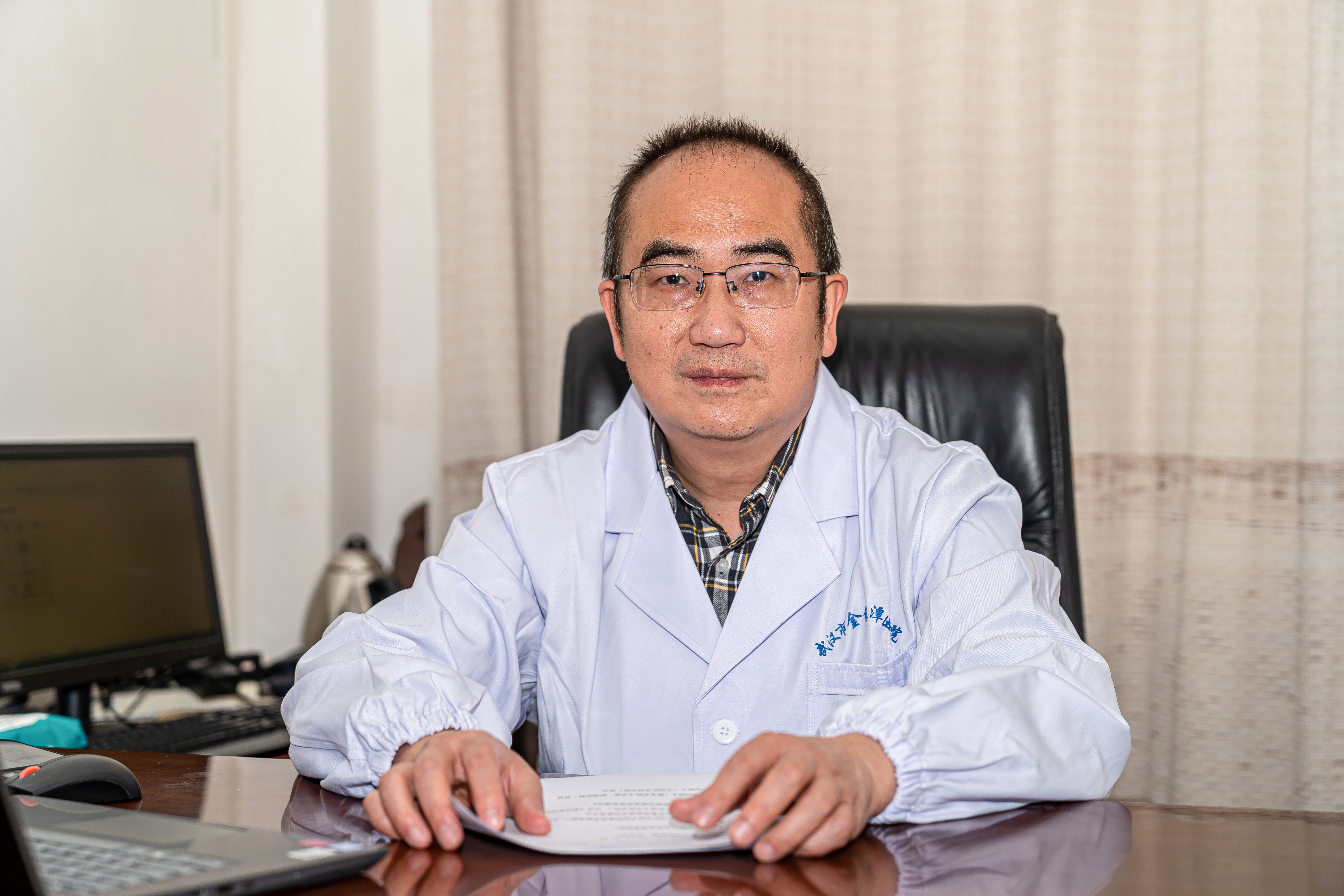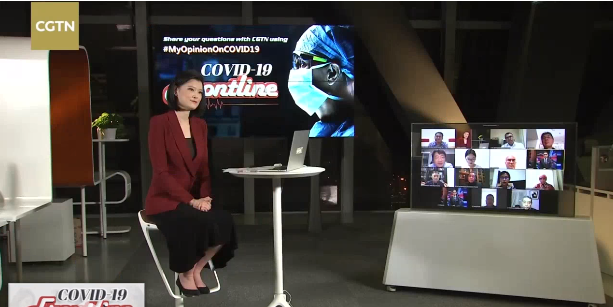Editor's note: On March 12, 2020, the World Health Organization (WHO) declared COVID-19 a pandemic, and as of Saturday (May 2), about 200 countries and regions have confirmed over 3,181,000 cases, according to the WHO. On CGTN's live program "COVID-19 Frontline," we invited medical workers and experts from China's epicenter Wuhan and from all over the world to share their experiences and take questions from social media, in the hope of providing more information for those who are battling against the pandemic.

Wuhan Jinyintan Hospital is one of the major designated hospitals to receive patients infected with COVID-19 in China's ground zero Wuhan City. In the early stage of the pandemic, many infected patients were treated there and the pressure on medical workers was enormous. In the latest episode of CGTN's live stream program "COVID-19 Frontline" held on Friday, Zhang Dingyu, president of the hospital, and his team were invited to share their first-hand experience treating COVID-19 patients with Indonesian counterparts.
Doctors from Wuhan Jinyintan Hospital share COVID-19 experience with Indonesian medics
Doni Monardo, Head of Indonesian National Board for Disaster Management, sent his greetings to the program through a video. "I appreciate the initiative of gathering information on how to deal with COVID-19 from the Indonesian and Chinese doctors. Currently, COVID-19 is a common enemy to the world, we all have to work together and adjust accordingly to fight against the disease. Through information sharing among doctors, we can all learn from each other’s experience and use it to tackle the crisis in our own countries," Monardo said.
01:25

There are around 10,551 confirmed cases in Indonesia thus far, the world's fourth most populous country, including 800 deaths and 1,591 patients who have recovered. The large scale social restrictions measures limiting mass transportation and public gatherings have been implemented in the country.
When can patients be discharged from the hospital?
Thomas Handoyo, internist-pulmonology consultant and member of COVID-19 treatment team of Dr. Kariadi Hospital in Semarang, Indonesia, asked about the treatment on asymptomatic patients with COVID-19 and whether another CT scan is needed before discharging the patients.
Dr. Zhang said they also have seen many recovered patients who have positive RT-PCR test results. In China, these patients are required to stay in hospital until they get two consecutively negative RT-PCR test results separated by at least one day.

Zhang Dingyu, president of Wuhan Jinyintan Hospital. /CGTN
Zhang Dingyu, president of Wuhan Jinyintan Hospital. /CGTN
According to a research on these patients who are consistently tested positive over a long period of time, it seems that they are not very infectious, Dr. Zhang added. But they still need to stay in hospital until they are tested negative. In addition, other criteria have to be met before hospital discharge, including showing no sign of respiratory symptoms, having a normal temperature and improved acute exudative lesions on chest CT images.
What are the long-term health consequences of COVID-19?
Dr. Thomas Handoyo also asked about whether the COVID-19 patients will suffer from any sequelae after recovery?
Dr. Zhang said they have started to follow up the patients who had been discharged from hospital since January, and they found most patients can expect no lasting harm. But some survivors may face a much more complicated picture. If partial pulmonary fibrosis persists and the pulmonary function is not fully restored, rehabilitation therapy is needed. For example, the doctors are using stem cell therapy in hope of treating pulmonary fibrosis, a disease occurs when lung tissue becomes damaged. The scar tissue can make it difficult for oxygen to get into blood.

CGTN's live stream program "COVID-19 Frontline." /CGTN
CGTN's live stream program "COVID-19 Frontline." /CGTN
Wu Ting, nurse at the Infectious Diseases Department of Wuhan Jinyintan Hospital, also shared her experience in treating patients with COVID-19. She said life care is especially important to the patients who have underlying diseases such as diabetes and high blood pressure. In Jinyintan Hospital, patients can also consult doctors and nurses online. Psychological care is vital. Sometimes nurses do recreational activities with patients in the ward or chat with them to reduce their stress.
In later episodes of "COVID-19 Frontline," more frontline doctors and experts from Wuhan will join in to share their experience with their colleagues from other parts of the world. If you have any questions regarding COVID-19, you can share with us using #MyOpinionOnCOVID19 on Facebook.
Videos by Sun Siyi
Cover image by Qu Bo